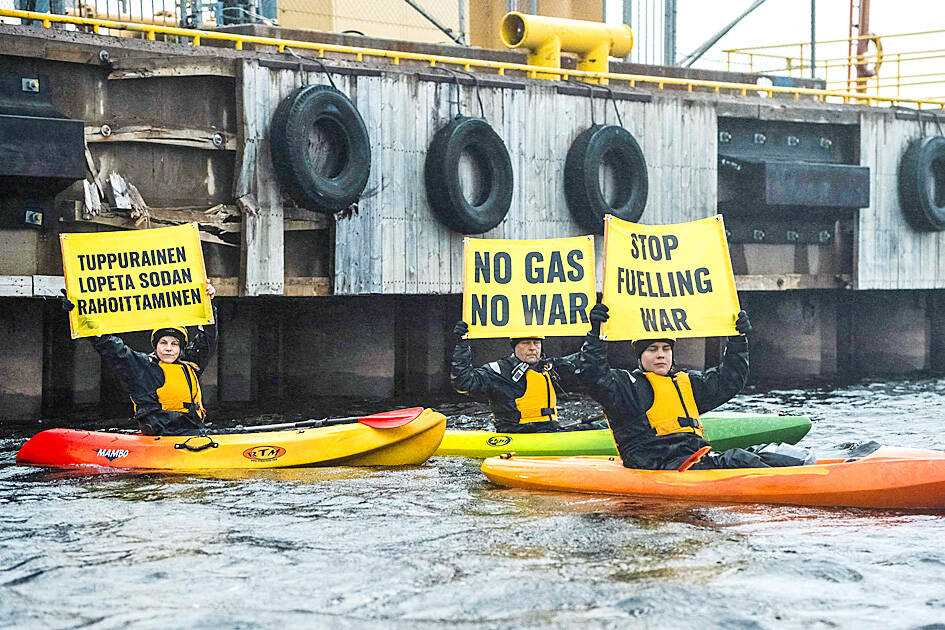Greenpeace and a raft of other environment groups yesterday issued the EU an ultimatum over its decision to grant some gas and nuclear power stations a “fake” green label under the bloc’s sustainable finance rules.
Eight Greenpeace organizations across Europe, as well as nonprofits ClientEarth, WWF, Transport & Environment and BUND have demanded a review of the decision to include gas and nuclear power in the EU’s green rulebook, known as the taxonomy.
The European Commission has until February to reply, or the groups said they would take the case to the European Court of Justice.

Photo: AFP / Antti Yrjonen / Greenpeace
“Gas is a leading cause of climate and economic chaos, while there is still no solution to the problem of nuclear radioactive waste and the risk of nuclear accidents is far too significant to ignore,” Greenpeace EU sustainable finance campaigner Ariadna Rodrigo said. “This fake green label is incompatible with EU environment and climate laws.”
The complaint is that channeling money to gas projects — albeit with strict conditions attached — is not compatible with the EU’s climate neutrality goal, which is enshrined into law, and the Paris Agreement.
The non-government organizations say that it would take money away from renewable sources of electricity such as wind and solar. Greenpeace highlighted the waste from nuclear power, as well as the long time needed to construct new facilities.
Last week, five nonprofits announced they would leave the EU Platform on Sustainable Finance, which provides technical advice to the EU Commission in protest over the taxonomy.
Austria and Luxembourg are also in the process of taking legal action against the decision, which would enter into force in the New Year after a last-ditch vote on an objection in the European Parliament in July was rejected.

THE TRAGEDY OF PUNCH: Footage of the seven-month-old Japanese macaque has gone viral online after he was rejected by his mother and formed a bond with a soft toy A baby monkey in Japan has captured hearts around the world after videos of him being bullied by other monkeys and rejected by his mother went viral last week. Punch, a Japanese macaque, was born in July last year at Ichikawa City Zoo. He has drawn international attention after zookeepers gave him a stuffed orangutan toy after he was abandoned by his mother. Without maternal guidance to help him integrate, Punch has turned to the toy for comfort. He has been filmed multiple times being dragged and chased by older Japanese macaques inside the enclosure. Early clips showed him wandering alone with

South Korea would soon no longer be one of the few countries where Google Maps does not work properly, after its security-conscious government reversed a two-decade stance to approve the export of high-precision map data to overseas servers. The approval was made “on the condition that strict security requirements are met,” the South Korean Ministry of Land, Infrastructure and Transport said. Those conditions include blurring military and other sensitive security-related facilities, as well as restricting longitude and latitude coordinates for South Korean territory on products such as Google Maps and Google Earth, it said. The decision is expected to hurt Naver and Kakao

MONEY GRAB: People were rushing to collect bills scattered on the ground after the plane transporting money crashed, which an official said hindered rescue efforts A cargo plane carrying money on Friday crashed near Bolivia’s capital, damaging about a dozen vehicles on highway, scattering bills on the ground and leaving at least 15 people dead and others injured, an official said. Bolivian Minister of Defense Marcelo Salinas said the Hercules C-130 plane was transporting newly printed Bolivian currency when it “landed and veered off the runway” at an airport in El Alto, a city adjacent to La Paz, before ending up in a nearby field. Firefighters managed to put out the flames that engulfed the aircraft. Fire chief Pavel Tovar said at least 15 people died, but

Australian Prime Minister Anthony Albanese yesterday said he did not take his security for granted, after he was evacuated from his residence for several hours following a bomb threat sent to a Chinese dance group. Albanese was evacuated from his Canberra residence late on Tuesday following the threat, and returned a few hours later after nothing suspicious was found. The bomb scare was among several e-mails threatening Albanese sent to a representative of Shen Yun, a classical Chinese dance troupe banned in China that is due to perform in Australia this month, a spokesperson for the group said in a statement. The e-mail